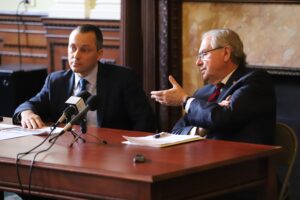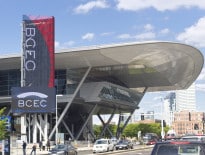
House Speaker Robert DeLeo (right) and Ways and Means Committee Chair Rep. Aaron Michlewitz (left) address reporters in this file photo. Photo by Sam Doran | State House News Service.
With no clear consensus on Beacon Hill for how to generate new money for transportation, House Speaker Robert DeLeo forcefully recommitted himself on Wednesday to holding a vote on a revenue package in the coming months, even as he continues to seek input from members and outside groups.
Months after DeLeo said he was delaying a once-promised fall debate until the new year and “shooting for January,” the Democratic leader said he does not have a firm timeline in mind, but wants the revenue issue behind him before the House turns its attention to annual budget deliberations in April.
“I’m uncertain as to exactly when, but I will tell you I am committed to taking up a transportation piece of legislation. It seems to me that every day that goes by there’s a further example of the need for transportation revenue and some work to begin relative to our transportation system,” DeLeo told reporters after a caucus meeting of House Democrats.
The contours of that debate, however, remain somewhat shrouded in mystery. Transportation Committee Chairman William Straus and Revenue Committee Chairman Mark Cusack have both strongly suggested that a gas tax increase will be part of the package, but it remains unclear even how much money House leaders are looking to generate, or what type of transportation investments they will guarantee in exchange for asking people to pay more.
Lawmakers are also facing pressure to pull new revenues from the business sector to improve transportation.
Work to Balance Different Voices
With Ways and Means Chairman Aaron Michlewitz and Transportation Committee Chairman William Straus both standing behind him, DeLeo said the chairmen have been “talking to various caucus groups, various members.”
“I don’t think we can let this go on, obviously, while we’re getting started and heavily into discussion relative to the budget. I think this has to be done before that,” DeLeo said. “So please don’t take what I’m saying in terms of the exact timing as that I’m backing off from my position that something has to be done relative to transportation.”
In an interview, Third Assistant Minority Leader Paul Frost of Auburn questioned whether a debate on transportation issues should happen at all, hinting at some of the opposition DeLeo may be trying to mollify.
“I’m not really sure why we need to be addressing any sort of transportation revenues. I mean. They’ve got a question on the ballot that’s supposed to handle all of that. That’s what we were told,” Frost said, referring to the $2 million projected to be generated by the household wealth surtax, if it passes.
Frost said that if DeLeo forces a vote on taxes many constituents will be asking their representatives why the legislature can’t “manage what you’re getting” during a period when state coffers have been brimming.
“There’s going to be a lot of resistance, I think even in the public, to raising revenue for transportation or for anything else, some sort of tax or fees, at this point, because people are going to say, ‘Hey, we’re paying a lot now and things are going well,’ ” Frost said.
DeLeo Skeptical of TCI
Recently, Gov. Charlie Baker’s push to forge a coalition of states from Maine to Delaware committed to reducing carbon emissions from vehicles and generating hundreds of millions of dollars for states like Massachusetts to invest in transportation has come under scrutiny.
DeLeo said he has taken note of comments made by the governors of Vermont, Maine, Connecticut and New Hampshire questioning the potential cost to consumers from the Transportation Climate Initiative (TCI), which is a cap-and-trade proposal that could add up to 17 cents to the price of gas.
“There doesn’t seem to be a whole lot of support for the concept, at least from what I see right now,” DeLeo said. “And what I’m especially concerned, what I was looking for, as we went through this process, was to make sure especially that the New England states would be on board. Now, I’m not saying that they’re all off, although I got the distinct impression that New Hampshire is.”
DeLeo noted that revenue from TCI would not materialize until at least 2022 if Baker is successful in keeping a coalition together, and he said he no longer feels comfortable factoring TCI into his thinking about transportation revenue given its uncertainty.
“I don’t think we can wait that long,” DeLeo said.
The Raise Up Coalition and the Green Justice Coalition also published a report on Wednesday in which they recommended balancing “any regressive ‘user taxes’ with revenue generated by ensuring that large, profitable corporations are paying their fair share.”
The two groups said the state could net $250 million to $350 million by taxing a portion of the domestic profits moved by large corporations to offshore accounts, and recommended a tiered increase in the corporate minimum tax in addition to the proposed 2022 ballot question to add a surtax of 4 percent on income over $1 million.




 |
| 

